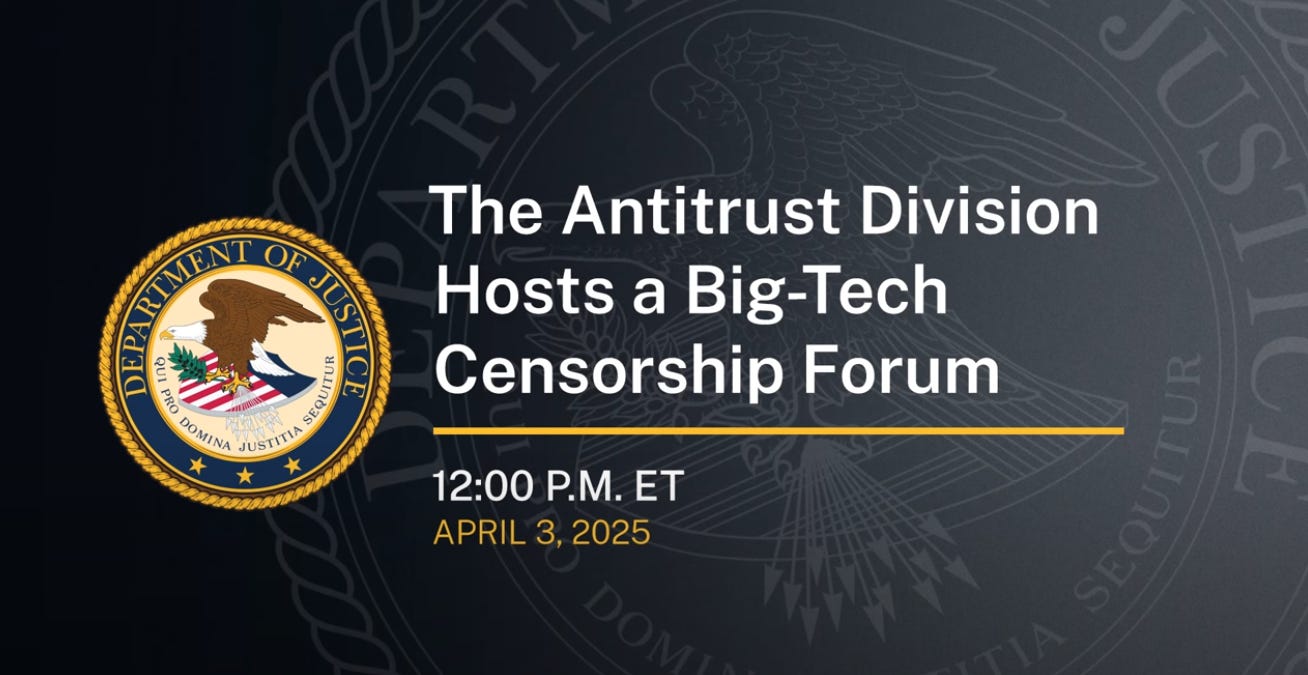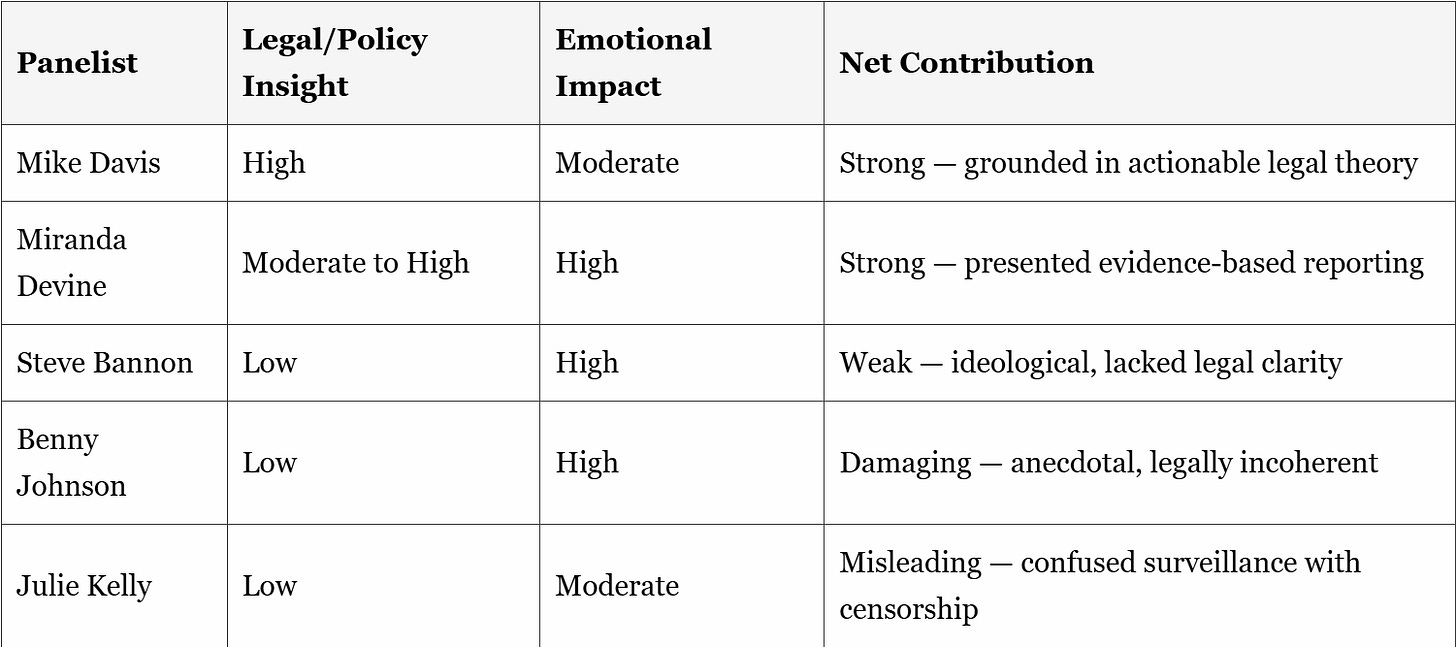On April 3, 2025, the Department of Justice’s Antitrust Division hosted a high-profile public forum on Big Tech censorship, bringing together federal regulators, conservative legal strategists, media personalities, and policy advocates. The event marked a shift from grievance to governance — a coordinated effort to move beyond complaints about content moderation and toward real enforcement strategies grounded in antitrust law, consumer protection, and communications policy.
While many participants brought well-reasoned, actionable ideas to the table, others relied on overstatement, ideological tropes, or legal confusion — undermining the seriousness of the cause they claimed to support.
Setting the Stage: A Coordinated Front
Before the panels began, three of the most influential regulatory officials in the federal government offered opening remarks that framed the stakes.
Gail Slater, Assistant Attorney General, Antitrust Division (DOJ)
Slater opened the day by arguing that technology platforms have become the new gatekeepers of culture — shaping not just markets, but minds. Quoting Andrew Breitbart, she reframed his famous line: “Politics is downstream from culture — and culture is downstream from technology.” She positioned the DOJ’s antitrust tools as critical in restoring fairness and competition in the digital public square.
Brendan Carr, Chairman, Federal Communications Commission (FCC)
Carr issued a sharp rebuke of Big Tech’s role in moderating speech. He called for Section 230 reform, algorithmic transparency, and regulatory oversight of media corporations that blur the line between platform and publisher.
“You don’t get First Amendment immunity when you’re acting like an editor.” — Brendan Carr
Carr also cited ongoing FCC investigations into companies like Disney, NPR, and Comcast for potential violations of public interest standards.
Andrew Ferguson, Chairman, Federal Trade Commission (FTC)
Ferguson provided the legal backbone of the forum. He argued that monopolistic control over speech is not just a moral concern — it's an antitrust concern. He suggested that platforms may violate consumer protection laws when they promise neutrality but censor ideologically, and floated the possibility of advertiser collusion investigations.
Together, these three signaled a clear message: Big Tech’s moderation practices are now within the federal enforcement crosshairs.
Panel I: Censorship and the Culture War
Moderated by DOJ official Omid Asafi, the first panel featured:
Steve Bannon, political strategist and podcaster
Mike Davis, founder of the Article III Project
Miranda Devine, New York Post columnist
Julie Kelly, independent journalist
Benny Johnson, conservative YouTuber and media personality
Key Themes from Panel I
1. Big Tech as Political Weapon
Panelists argued that Big Tech actively suppresses conservative content. Bannon called the platforms a “globalist cartel,” while Johnson claimed conservative humor and memes are “being erased by code.”
2. The Hunter Biden Laptop
Miranda Devine detailed how her 2020 story on Hunter Biden’s laptop was suppressed by Twitter and Facebook. She cited internal communications and FBI briefings as evidence of government-platform coordination.
3. Antitrust as a Speech Tool
Mike Davis made the legal argument that antitrust law can and should be used to protect speech when monopolies suppress it through coordinated practices.
“This isn’t about regulating speech — it’s about breaking up monopolies that are rigging the public square.” — Mike Davis
Panelist Evaluation: Contribution to Credibility
Takeaway: Davis and Devine elevated the conversation. Bannon added rhetorical flair but little substance. Johnson and Kelly, however, actively weakened the panel’s credibility — relying on emotion, mischaracterizations, and legally flawed assumptions.
Panel II: From Grievance to Governance
This panel focused on legal solutions. Experts discussed:
Using antitrust laws to investigate advertiser collusion
Applying consumer protection to terms-of-service deception
Revising Section 230 to condition immunity on neutrality
Enforcing FCC transparency regulations
Legal Tools in Play
Where the Argument Breaks Down
While the forum featured serious and strategic proposals from legal experts and policymakers, it was also burdened by voices whose contributions lacked rigor — and in some cases, actively undermined the credibility of the event’s legal and constitutional framing.
Benny Johnson: Performance Without Policy
Benny Johnson's remarks were high on emotion but low on content. He described Big Tech as “erasing conservative humor,” referenced memes being suppressed, and criticized Silicon Valley elites as “digital tyrants.” His tone was combative and theatrical — drawing applause from some in the audience — but his comments lacked any legal framework, policy proposal, or enforcement path.
Johnson did not engage with Section 230, antitrust law, consumer protections, or any other statutory mechanism discussed at length by regulators and legal experts. Instead, he relied on anecdotal experiences and populist rhetoric, reducing complex regulatory challenges to a binary of “patriots vs. censors.”
The problem wasn’t just that his remarks were legally hollow. It’s that they implied the issue of censorship is best fought with viral posts and outrage — rather than institutional reform and judicial action.
In a setting designed to elevate the legal case against Big Tech, Johnson’s presence at times turned the conversation into a culture war sideshow, distracting from the enforceable claims others were working to establish.
Julie Kelly: A Dangerous Conflation
Julie Kelly’s remarks were more troubling. She asserted that the Department of Justice’s use of social media to investigate and prosecute January 6 defendants was itself a form of censorship — suggesting that the federal government’s access to digital communications for evidence amounted to ideological suppression.
This framing is both legally inaccurate and politically reckless.
Government use of open-source intelligence or subpoenaed social media data in criminal cases is not censorship — it is standard investigative procedure.
Conflating surveillance with censorship implies that any law enforcement use of digital platforms is inherently unjust — a position that would undermine legitimate prosecutions and mischaracterize constitutional law.
By suggesting that criminal investigations are equivalent to speech suppression, Kelly risked discrediting the entire forum’s focus on actual First Amendment harms — namely, those committed by private monopolies, not government prosecutors.
Her presence on the panel also opened the door for critics to accuse the event of minimizing January 6 or politicizing law enforcement — a distraction from the forum’s central mission of challenging corporate control over expression.
Why It Matters
In legal reform spaces — especially those seeking to challenge entrenched power — credibility is everything. Courts, regulators, and lawmakers will not be persuaded by slogans or memes. They will respond to evidence, precedent, and statutory logic.
Johnson and Kelly did not just fail to meet that standard — they actively weakened the case being made by the forum’s strongest contributors.
Their inclusion may have served short-term political theatrics, but it came at the cost of long-term strategic clarity. In a legal battle over free speech and market power, you cannot afford to confuse the issue — or the audience.
Who Hit It Out of the Park — and Why It Mattered
Among all the voices at the forum, a few stood out for their clarity, legal precision, and strategic insight. These were the speakers who not only diagnosed the problem but proposed credible solutions grounded in law and enforceable policy. They didn’t just vent — they advanced the cause.
Mike Davis — The Legal Architect
Role: Founder of the Article III Project, former Chief Counsel for Nominations to the Senate Judiciary Committee.
Why He Stood Out: Davis was the clearest voice on how antitrust law can be used to combat viewpoint suppression. He argued that Big Tech’s monopoly power doesn’t just distort markets — it distorts speech.
What He Said:
“This isn’t about regulating speech — it’s about breaking up monopolies that are rigging the public square.”
Why It Mattered: Davis offered a statutory path forward. He tied free speech concerns to existing legal frameworks, particularly Section 2 of the Sherman Act, and emphasized that the First Amendment doesn’t protect collusion or fraud. His remarks gave the forum a solid legal foundation that could be presented in court or Congress.
Miranda Devine — The Evidence-Based Journalist
Role: Columnist at the New York Post, author of investigative work on the Hunter Biden laptop story.
Why She Stood Out: Devine brought the receipts. She walked through how Twitter and Facebook suppressed the New York Post’s 2020 reporting on Hunter Biden, citing internal communications, FBI briefings, and the now-public “Twitter Files.”
What She Said:
“This wasn’t content moderation — it was election interference, coordinated with government pressure.”
Why It Mattered: Devine connected abstract legal questions to real-world harm and timeline-based evidence. Her reporting has already been referenced in multiple lawsuits and congressional hearings. She gave the forum case material — not just commentary.
Andrew Ferguson — The Institutional Strategist
Role: Chairman of the Federal Trade Commission.
Why He Stood Out: Ferguson elevated the discussion from politics to policy. He emphasized how deceptive platform practices — such as claiming neutrality while acting ideologically — may violate consumer protection laws.
What He Said:
“When a platform says it’s neutral, but secretly suppresses content based on viewpoint, that’s not just unethical — it may be unlawful.”
Why It Mattered: Ferguson offered a regulatory hook for action, linking the First Amendment debate to FTC enforcement authority under the Deceptive Trade Practices Act. His remarks showed that the federal government has tools it can use now — without waiting for new laws.
Brendan Carr — The Regulator with Teeth
Role: Chairman of the Federal Communications Commission.
Why He Stood Out: Carr was forceful and unapologetic in calling for FCC action against platforms and media conglomerates that act as editors under the guise of neutrality.
What He Said:
“You don’t get First Amendment immunity when you’re acting like an editor.”
Why It Mattered: Carr framed the issue in a way that resonates with both constitutional conservatives and media law scholars. By invoking public interest standards and broadcast obligations, he opened the door to transparency mandates and potential licensing reviews — real enforcement levers.
Honorable Mention
Gail Slater (DOJ Antitrust Chief): Framed the issue in cultural terms — quoting Andrew Breitbart and emphasizing that “culture is downstream of technology.” She helped set the tone for the day by arguing that tech platforms are now cultural monopolists, not just market players.
What Comes Next?
Near-Term Developments
DOJ and FTC investigations into collusion and deception
FCC rulemaking on transparency and public-interest standards
Congressional action on Section 230 and competition bills
Long-Term Strategy
Ground the arguments in law, not outrage
Promote credible messengers over ideological performers
Build case law that can survive judicial scrutiny
From Outrage to Outcomes — But Choose Your Messengers Wisely
This forum marked a pivot: from populist complaint to legal confrontation. But for that confrontation to succeed, the movement must choose messengers who can translate outrage into enforceable claims.
Mike Davis and Miranda Devine modeled that approach. Benny Johnson and Julie Kelly did not. Their presence made it easier for critics to dismiss the entire event as unserious.
“The war on Big Tech censorship may have started with memes and shadow bans — but it will be won or lost in courtrooms and congressional hearing rooms.” — Closing statement from moderator Omid Asafi




